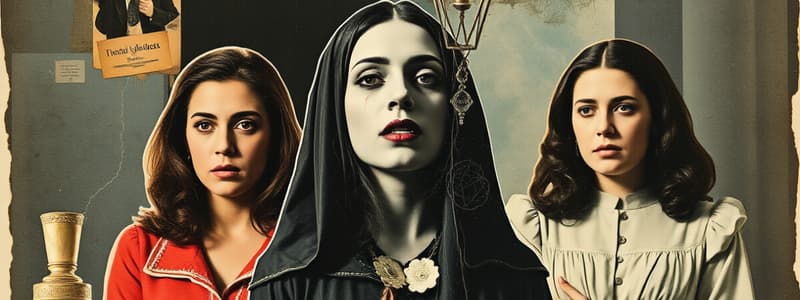Podcast
Questions and Answers
What does 'la llorona' mean in English?
What does 'la llorona' mean in English?
- Screaming woman
- Crying woman
- Weeping woman (correct)
- Gentlewoman
What is the definition of 'el día de los muertos'?
What is the definition of 'el día de los muertos'?
Day of the Dead
What is the meaning of 'el cempasúchil'?
What is the meaning of 'el cempasúchil'?
marigold
What is 'el pan de muerto'?
What is 'el pan de muerto'?
Match the following words with their definitions:
Match the following words with their definitions:
What does 'los tejocotes' refer to?
What does 'los tejocotes' refer to?
What is the English translation of 'La mujer llora'?
What is the English translation of 'La mujer llora'?
What does 'Yo amo a mis hijos' mean?
What does 'Yo amo a mis hijos' mean?
What is the meaning of 'la flor'?
What is the meaning of 'la flor'?
What is the definition of 'indígena'?
What is the definition of 'indígena'?
What is 'el barco' in English?
What is 'el barco' in English?
Flashcards are hidden until you start studying
Study Notes
Characters
- Beto - Character in "La Leyenda de la Llorona."
- Kika - Another character associated with the narrative.
- Leo San Juan - Central character connected to the story’s events.
- Yoltzín - Character contributing to the plot development.
- Don Andrés - A pivotal character in the storyline.
- Teodora - Character with significance to the unfolding drama.
- Las calaveritas - Movie characters that add cultural depth to the story.
- El alebrije - A magical creature that plays an important role.
- Los alebrijes - Colorful Mexican folk art sculptures that animate in the film.
Cultural Terms
- La llorona - Translates to "the weeping woman," the central figure of the legend.
- La leyenda - Means "the legend," highlighting the folkloric aspect of the narrative.
- El día de los muertos - "Day of the Dead," a key celebration in Mexican culture.
- La noche de brujas - Refers to "Halloween."
- El cementerio - "The cemetery," an important setting in the story.
- El cempasúchil - Known as "marigold," symbolizing the afterlife and honoring deceased loved ones.
- La flor - Means "the flower," often associated with Día de los Muertos.
- El pan de muerto - "Bread of the dead," a traditional offering during Día de los Muertos.
Important Dates
- El dos de noviembre - "November 2nd," the main day of Día de los Muertos.
- El primero de noviembre - "November 1st," a day to honor deceased children.
- El treinta y uno de octubre - "October 31st," Halloween, a precursor to Día de los Muertos.
Language and Heritage
- Nahuatl - Indigenous language with historical relevance.
- Los Aztecas - Indigenous people of Mexico, connected to the cultural background.
- Indígena - Refers to native or indigenous persons, emphasizing cultural identity.
Miscellaneous
- Los dulces - Means "candy," often related to celebrations.
- Mis hijos - Translates to "my children," important in familial themes.
- Llorar - Means "to cry," a key action related to the emotional narrative.
- La vida - Translates to "life," symbolizing themes of existence and mortality.
Expressions
- "La llorona" means weeping woman in English.
- La mujer llora. - "The woman cries."
- La mujer grita. - "The woman yells."
- Yo amo a mis hijos. - "I love my kids."
Objects of Interest
- El camafeo - A term needing further definition in context.
- Los tejocotes - Refers to "stone fruit," likely tied to cultural practices.
- La isla de las muñecas - "Island of the dolls," a location of eerie folklore.
- El caballero - Means "gentleman" or "knight," potentially relating to character dynamics.
- El barco - "The boat," may symbolize journeys or transitions within the plot.
- Mi mamá - Means "my mom," reflecting personal relationships central to the tale.
- Los niños - Means "children," involving themes of youth and innocence.
- Las calaveras de azúcar - "Sugar skulls," popular items during Día de los Muertos rituals.
Studying That Suits You
Use AI to generate personalized quizzes and flashcards to suit your learning preferences.

